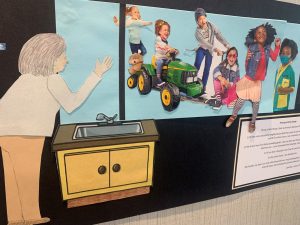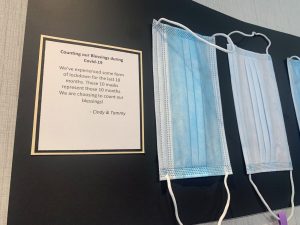From Isolation to Intentionality, Art Reveals Range of Feelings During COVID-19
Therapist Susan Devine curated artwork from friends and clients to show the varied feelings surrounding COVID-19.
“My clients have been talking so much about COVID that I thought we’ve got to get this together to shop people that we’re not alone,” said Susan Devine, who has an office in Eden Prairie. “This is just a small token, but by hope and prayer is that my clients, people who have contributed to this will feel heard and know that they are not alone.”
Devine uses art therapy in her practice, where she encourages a client to create a piece of art that reflects what he or she might be experiencing. Then, Devine can talk about those feelings using the artwork.
“The emotions they’ve experienced are now projected out on the artwork. There’s some objectivity and now we can deconstruct what’s going on,” said Devine.
The variety of artwork that Devine collected shows that COVID-19 solicits a variety of responses. They include isolation, frustration and sadness.

Dorothy Hansen, a senior who lives in Plymouth, made a collage. She thought about what she has missed since the pandemic started, and narrowed it down to three things.
“One is the neighborhood kids. You don’t even see them out,” said Hansen. “Ordinarily this place is swarming with kids.”
Hansen has a special relationship with the neighborhood kids. She would give them ice cream in the summer, invite them over for dinner on Friday nights, and calls them her neighborhood grandchildren.
But that’s not the only loss. Hansen misses her church family. She also missed going to the hospital for the birth of her first grandchild. The baby, which also shares Hansen’s name, was born on Thanksgiving.
Hansen shared all of these thoughts in her collage.
“I pictured myself looking out the window and the lovely things I can’t get to,” said Hansen. “It makes it more poignant, more visual.”

Dorothy Hansen’s artwork
Eleven-year-old Lorien Compton also shared her artwork with Susan Devine. Her artwork showed the negative and the positive facets of COVID-19.
“I think it’s good to show both sides because it shows people that things are as bad as they think they are. They should still be cautious,” said Compton.
Compton misses going to the theater to see a movie, but also remembered the intentional way she and her family brought joy to others, like painting rocks and putting cards in front of driveways for neighbors.
Susan Devine saw some of that intentional positivity reflected in the artwork. One pair of moms from Plymouth created a piece of art featuring masks that emphasized happiness in having college kids back home, bonfires with friends and intentionally slowing life down.

Looking through the collected art, you can see that there’s no right or wrong way to feel about COVID-19. Like much of life, it’s complicated and nuanced. But sharing the art in one place gives a sense that no matter what you may feel, chances are, someone else likely feels the same way.



